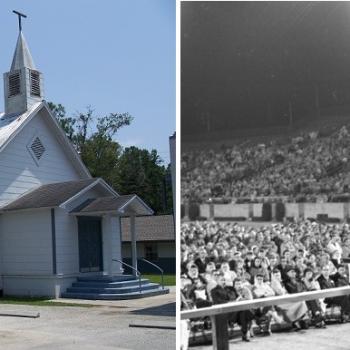by Joshua Ryan Butler
Be sure to check out our Book Club on The Pursuing God.
The gospel highlights not our pursuit of God, but God’s pursuit of us. Unfortunately, many caricatures get the biblical story backward. Here’s three ways the gospel confronts our caricatures, to reveal afresh the relentless love of God.
#1 GOD AND SIN
Caricature: God can’t stand to be in the presence of sin.
Gospel: Sin can’t stand to be in the presence of God.
Many envision God backing away when we sin, afraid of being tainted—so we’re encouraged to clean ourselves up and go find him. But when Adam and Eve rebel, and sin enters the world, God comes after his little insurgents in the garden, calling out “Where are you?”—while they run and hide (and cover themselves with leaves).
God’s not afraid of getting dirty; sin runs from God.
When God’s glory comes down Mt. Sinai to dwell with his people, the people retreat in fear (like Adam and Eve in the Garden) and cover the glory with a veil—yet God continues to pursue and make them his people. When Jesus walks our dust in his life and ministry, he is God searching in the garden of his world, calling out “Where are you?” to his lost and wandering children. He is the glory of God coming down the mountain to dwell in the midst of his rebellious people.
And John tells us our problem is not that we weren’t good enough, smart enough, didn’t jump high enough for God. No, rather, our problem is that we “loved darkness rather than light.” (John 3:19)
So our problem is not that God can’t stand to be in the presence of sin and runs away when we mess up. Our problem is, rather, that sin can’t stand to be in the presence of God—the very nature of our predicament is that we run from God, preferring our independence and autonomy to living in union with him and submission to his kingdom.
We’re invited to lay our lives vulnerably and openly before God, receiving his pursuit of us.
#2 JESUS AND THE CROSS
Caricature: Jesus bearing our punishment is an act of divine child abuse.
Gospel: Jesus bearing our punishment is an act of divine love.
Some mock the cross today as divine child abuse—they seem to envision the Father punching Jesus in the face or something like that. But a good first question to ask, if Jesus bears our punishment, is “What is that punishment?” In the biblical story, exile and death are the punishment for sin.
So when Jesus is rejected and cast outside the city (into exile), crucified under the brutal pagan powers (in death), and goes into the grave as the sinless One, this is itself an image of Jesus taking our punishment upon himself and bearing it for our redemption.
As Jesus bears our distance from the presence of God upon himself (in his humanity), he simultaneously bears the presence of God within himself (in his divinity) into our distance. The Great Reconciler unites himself with us in our tragic estate, in order to raise us to bring us home.
The Father and Son are not pitted against one another at the cross, but working in union for the world’s redemption. At the cross, the Father, through the Son, in the Spirit, is taking our tragedy and trauma, our idolatry and injustice, our sin, suffering, and shame, upon himself in the vicarious humanity of Christ, in order to reconcile us and bring us home.
The cross is a triune act. And it is an act of love.
#3 THE WAY OF SALVATION
Caricature: Jesus is the one and only way we go out to find God.
Gospel: Jesus is the unique and decisive way God has come to us.
When many hear “Jesus is the way,” it can sound arrogant and condescending, like we Christians have it all figured out and everyone else is way off track. But we often frame this backward: Jesus isn’t the one and only way we go out into the universe to find God. Jesus is the unique and decisive way God has come to us.
Jesus doesn’t say, “I’ll show you the way.” He says, rather, “I am the way.” Jesus doesn’t say, I’ll point you on the trail that leads to the Father. He says, The Father is in me and when you see me you’ve seen the Father.
Jesus is not a road map—he’ the destination.
Jesus is the Way our world is reconciled to God.
Jesus is the Truth of God’s goodness outstretched to embrace resistant rebels.
Jesus is the Life that restores our God-haunted, sin-struck world back into the presence of the Father.
Jesus is the way God has come to us.
Dive deeper into these and nine other paradigm shifts in Joshua Ryan Butler’s new book: The Pursuing God: A Reckless, Irrational, Obsessed Love That’s Dying to Bring Us Home (Thomas Nelson, May 2016).
 Joshua Ryan Butler is the author of The Skeletons in God’s Closet (free sample chapter, video trailer, and more here) and pastor of local & global outreach at Imago Dei Community (Portland, OR).
Joshua Ryan Butler is the author of The Skeletons in God’s Closet (free sample chapter, video trailer, and more here) and pastor of local & global outreach at Imago Dei Community (Portland, OR).














